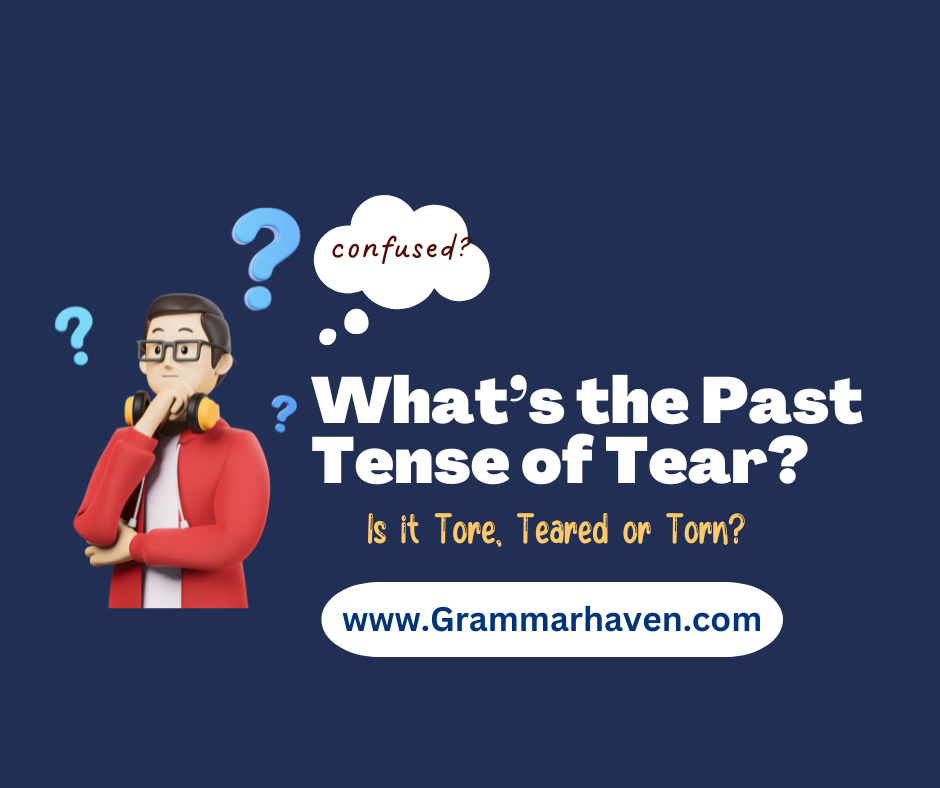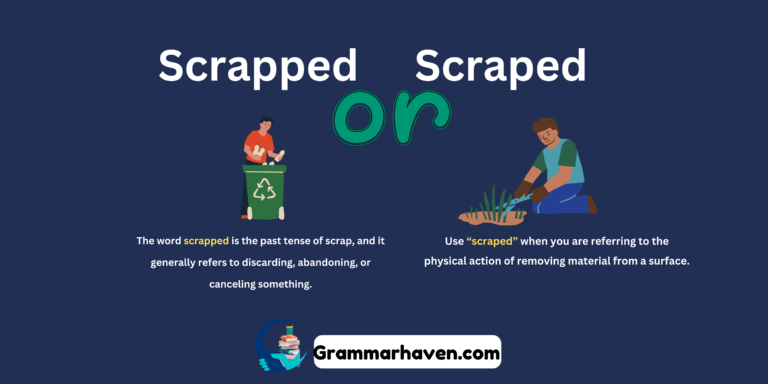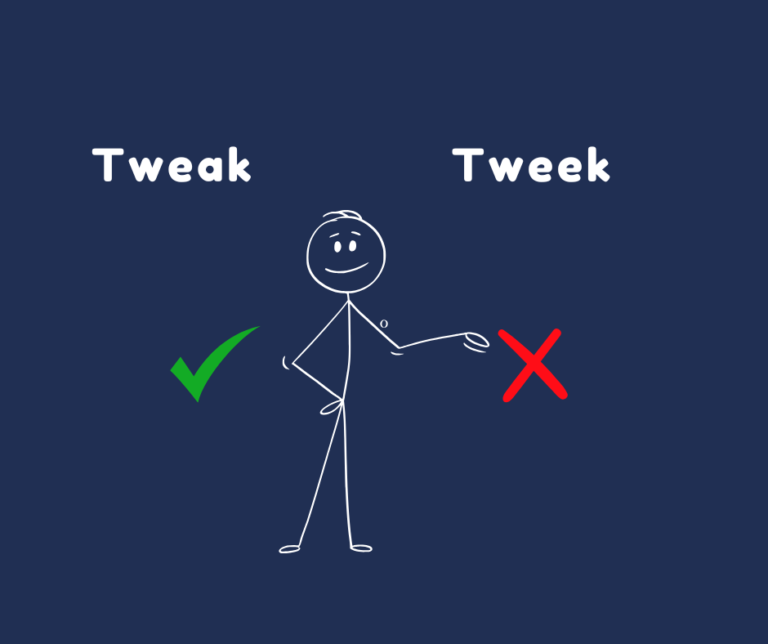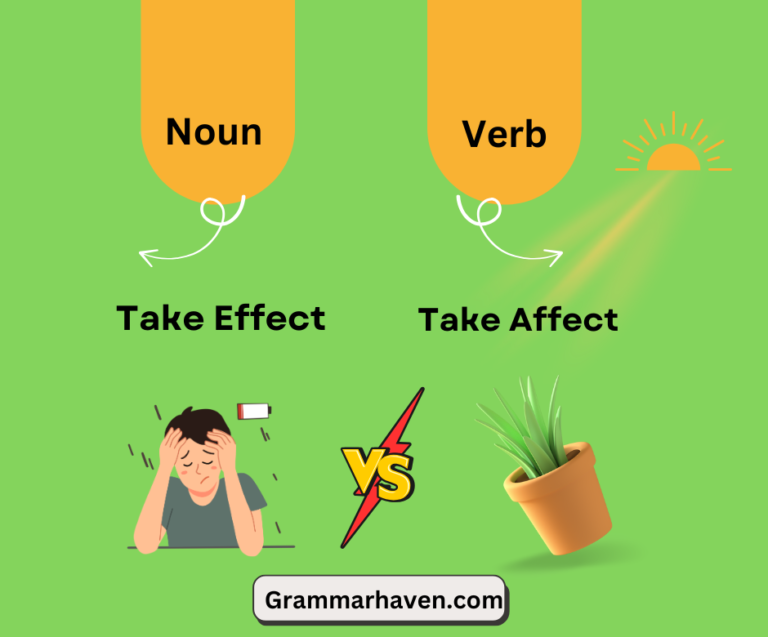What’s the Past Tense of Tear? Is it Tore, Teared or Torn?
The past tense of “tear” is often found confusing due to the dual nature of word as both a verb (transitive and intransitive)and a noun, each has its own set of rules.
This common dilemma leaves many in doubt , wondering whether to use “tore,” “teared,” or “torn.” Understanding the correct usage is essential not just for mastering grammar but also for expressing yourself clearly in writing and conversation. In this article, we’ll unravel the complexities surrounding the past tense of “tear” and give you the clarity needed to use it accurately in any context.
Reasons Behind Confusion?
The confusion surrounding the past tense of “tear” stems from its multiple meanings and roles in English. Let’s breakdown it to understand easily :
Dual Verb Usage:
- Transitive Verb: Refers to an object being pulled apart (e.g., “She tore the paper”).
- Intransitive Verb: Describes something coming apart on its own (e.g., “The fabric tore”).
The dual nature can make usage tricky, particularly in different contexts.
Physical vs. Emotional Use:
- For physical actions, the past tense “tore” is clear and unambiguous.
- For emotions : such as being “torn” between decisions, the intransitive nature complicates the grammatical structure.
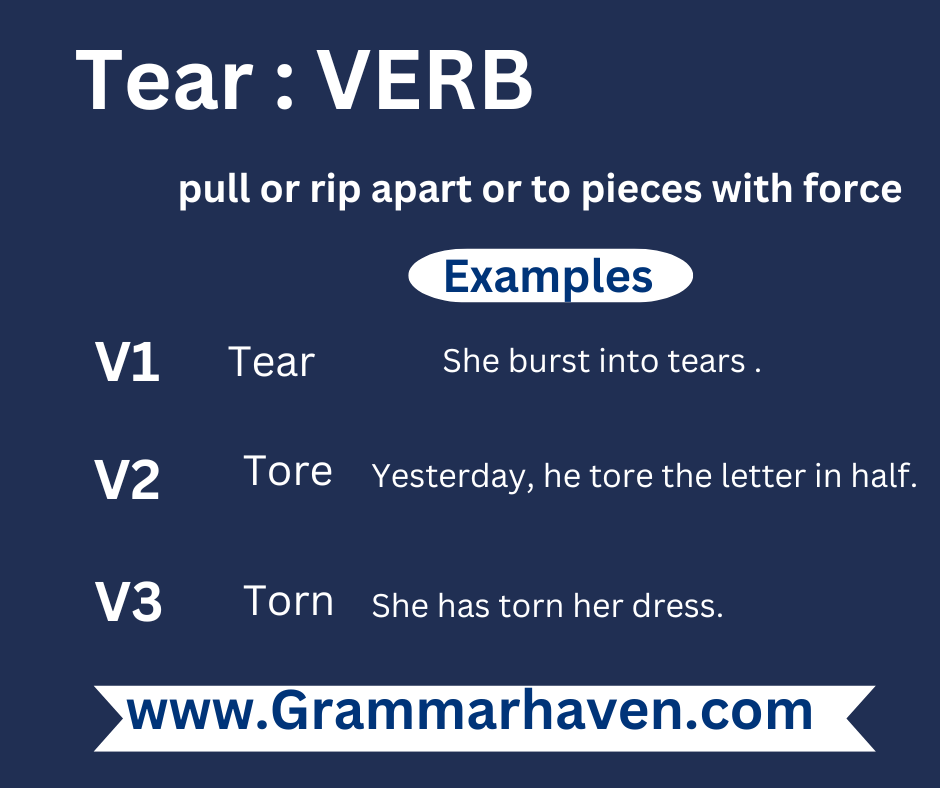
Noun Usage of “Tear”:
- It can mean a rip or a drop of fluid from the eyes.
- This overlap in meanings adds to the confusion about its past forms.
Common Misunderstandings:
- “Tore”: Correct past tense for ripping something apart.
- “Teared”: Incorrectly used for crying (the correct phrase is “shed tears”).
- “Torn”: Used as a past participle, often in emotional contexts.
Language Complexity:
- The interplay of meanings and functions demonstrates the richness of the English language.
- Embracing these nuances deepens one’s understanding and appreciation of linguistic subtleties.
The Past Tense of “Tear”
To understand the past tense of “tear,” it’s important to distinguish between “tore,” “torn,” and “teared,” as each is used for different purposes depending on the context.
Tore: This is the simple past tense of “tear” when referring to ripping or pulling something apart. “Tore” used to describe an action that was completed in the past.
Examples:
- Yesterday, he tore the letter in half.
- Her daughter tore the page out of the book.
Torn: This is the past participle form of “tear,” typically used with helping verbs such as “has,” “have,” or “had.” It mostly serves in more complex verb structures or in passive voice sentences.
Examples:
- She has torn her dress.
- The paper was torn by the wind.
Teared: This form is used when referring to the act of crying or shedding tears. While “tear” related to ripping becomes “tore” or “torn,” the version related to crying becomes “teared” in the past tense.
Examples:
- She teared up during the sad movie.
- His eyes teared as he recalled the memory.
Key Takeaway:
- Use “tore” for simple past actions involving ripping.
- Use “torn” as the past participle.
- Use “teared” only when referring to crying or shedding tears.
Pronunciation of “Tear,” “Tore,” “Torn,” and “Teared”
Navigating the pronunciation and meaning of these words can be tricky. Here’s a simplified breakdown:
- “Tear”
- as in to rip
- Pronunciation: Rhymes with “air.”
- Its sound may confuse non-native speakers due to its difference from the noun “tear” (a drop from the eye).
- “Tore” :
- past tense of tear
- Pronunciation: Rhymes with “more.”
- Refers to a past action, with a subtle vowel shift from “tear.”
- “Torn”
- past participle of tear
- Pronunciation: Rhymes with “horn.”
- Usage: Reflects a completed action or state (e.g., “The fabric is torn”).
- Emotional weight: Suggests irreversible damage or deeper impact compared to “tear.”
- “Teared”
- related to crying
- Pronunciation: Rhymes with “feared.”
- Refers to the act of shedding tears.
Synonyms for “Tear,” “Tore,” “Torn,” and “Teared”
| Tear: Present Tense | Tore : Simple past Tense | Torn : past participle | Teared : past tense for crying |
| Rip | Ripped | Frayed | Wept |
| Slash | Slashed | Mangled | Blubbered |
| Shred | Shredded | Severed | Sniveled |
| Rapture | Raptured | Ragged | Bawled |
| Split | Split | Damaged | Sobbed |
| Gash | Gashed | Lacerated | Cried |
Read synonyms of totaling or totalling here .
Origins of the Word “Tear”
Dual Meaning: The word “tear” reflects both physical and emotional aspects—ripping something apart and shedding emotional droplets.
Etymology: Originates from Old English “teran,” meaning to rip or pull apart, initially associated with physical destruction.
Evolution of Meaning: Over time, it adopted a softer meaning, representing teardrops linked to emotions like joy or sorrow.
Emotional Significance: Tears symbolize vulnerability and connection, capturing emotions that words often cannot express.
Cultural Universality: In many cultures, tears are seen as a powerful emotional release and an essential part of human expression.
Profound Insight: The duality of “tear” illustrates that breaking apart can be necessary for healing and growth, both physically and emotionally.
Use of “Tear,” “Tore,” “Torn,” and “Teared”
in Sentences:
Tear (The Present Tense)
- Be careful not to tear the paper while opening the envelope.
- She tried not to tear the fabric as she adjusted the dress.
- The strong wind can easily tear down weak branches.
Tore (The Simple Past Tense)
- He tore the letter into pieces after reading the bad news.
- The dog excitedly tore through the wrapping paper to find its toy.
- She accidentally tore her jeans while climbing the fence.
Torn (The Past Participle)
- His shirt was badly torn after the intense game.
- The flag had been torn by the harsh winds.
- She felt emotionally torn between her career and family commitments.
Teared (The Past Tense of Tear for Crying or Shedding Tears)
- She teared up when she saw her childhood home again.
- His eyes teared as he listened to the emotional speech.
- I teared slightly during the heartfelt movie scene.
You may also like to read use of trailer in sentences
Conclusion:
The word “tear” is quite versatile as it is evident through various forms, each conveying distinct emotions or actions. More often “tear“ evokes a sense of empathy, as in shedding a tear out of emotions. “Tore” reflects intense actions driven, like tearing a letter or paper in frustration. “Torn”refers to pain or division, often tied to broken relationships. Meanwhile, “teared” captures spontaneous emotional responses, like teared-up eyes during a heartfelt moment. Together, these forms enrich language, allowing us to express a wide range of human experiences.
Sources:
Merriam-Webster (Tear Definition & Meaning), Wikipedia (Tears), and Etymonline (Etymology of tear by etymonline).

